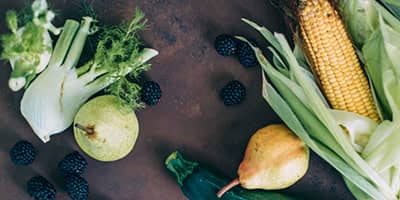
Alles zur Zutat Quittengelee
Quittengelee Rezepte
Entdecke unseren neuesten Kochrezepte für die Zutat "Quittengelee". Noch mehr Rezepte findest du auf unserer Rezepte-Übersicht.
Quitten-Kürbis-Pfanne mit Quinoa Foto: SevenCooks
Foto: SevenCooks 91
91
 Foto: SevenCooks
Foto: SevenCooksQuitten-Kürbis-Pfanne mit Quinoa
Einfach | 35 Min. | 433 kcal
Löwenzahnsalat mit Blumenkohl Foto: Monika Schürle und Maria Grossmann
Foto: Monika Schürle und Maria Grossmann 12
12
 Foto: Monika Schürle und Maria Grossmann
Foto: Monika Schürle und Maria GrossmannLöwenzahnsalat mit Blumenkohl
Einfach | 45 Min. | 127 kcal
Spargel mit Passionsfrucht-Vinaigrette Foto: Wolfgang Schardt
Foto: Wolfgang Schardt 14
14
 Foto: Wolfgang Schardt
Foto: Wolfgang SchardtSpargel mit Passionsfrucht-Vinaigrette
Mittel | 45 Min. | 408 kcal
Rotkohl-Rettich-Coleslaw Foto: Wolfgang Schardt
Foto: Wolfgang Schardt 20
20
 Foto: Wolfgang Schardt
Foto: Wolfgang SchardtRotkohl-Rettich-Coleslaw
Mittel | 4,8 Std. | 316 kcal
Teilen:
256kcal12%
Brennwert
1.072kJ12%
Energie
35GRAMM1%
Wasser
0,2GRAMM0%
Eiweiß
0,2GRAMM0%
Fett
62GRAMM24%
Kohlenhydrate
2,2GRAMM0%
Ballaststoffe
0,2GRAMM0%
Minerale
0,3GRAMM0%
Säuren
0GRAMM0%
Alkohol
Quittengelee enthält 1.072 kJ Brennwert bzw. 256 kcal Energie pro 100 g. Das deckt etwa 12,2 % des Tagesbedarfs. Zudem sind 0,19 g Eiweiß (0 % d. Tagesbedarfs), 0,184 g Fett (0 %) als auch 62,22 g Kohlenhydrate (23,6 %) enthalten.
Allergene
Fruktose
Fruktose
Fruktose (Fruchtzucker) ist ein Einfachzucker, der in unterschiedlich hoher Konzentration in vielen Lebensmitteln steckt. Zum Beispiel in Obst, Gemüse, aber auch Honig und Haushaltszucker. Mit diesem Icon weisen wir auf Lebensmittel im Rezept hin, welche einen Fruktoseanteil von über 2000 mg pro 100 g haben.Vitamine pro 100g
- Vitamin A-Retinoläquivalent1 µg
- Vitamin A-Beta-Carotin6 µg
- Vitamin E-Tocopheroläquivalent74 µg
- Vitamin E-Alpha-Tocopherol74 µg
- Vitamin B1-Thiamin3 µg
- Vitamin B2-Riboflavin3 µg
- Vitamin B3-Niacin, Nicotinsäure22 µg
- Vitamin B3-Niacinäquivalent39 µg
- Vitamin B5-Pantothensäure9 µg
- Vitamin B6-Pyridoxin5 µg
- Vitamin C-Ascorbinsäure479 µg
Mineralstoffe pro 100g
- Natrium1 mg
- Kalium85 mg
- Calcium5 mg
- Magnesium4 mg
- Phosphor9 mg
- Schwefel2 mg
- Chlorid2 mg
Spurenelemente pro 100g
- Eisen497 µg
- Zink106 µg
- Kupfer53 µg
- Mangan17 µg
- Fluorid2 µg
- Iodid0.7 µg


 Foto: Wolfgang Schardt
Foto: Wolfgang Schardt Foto: Wolfgang Schardt
Foto: Wolfgang Schardt